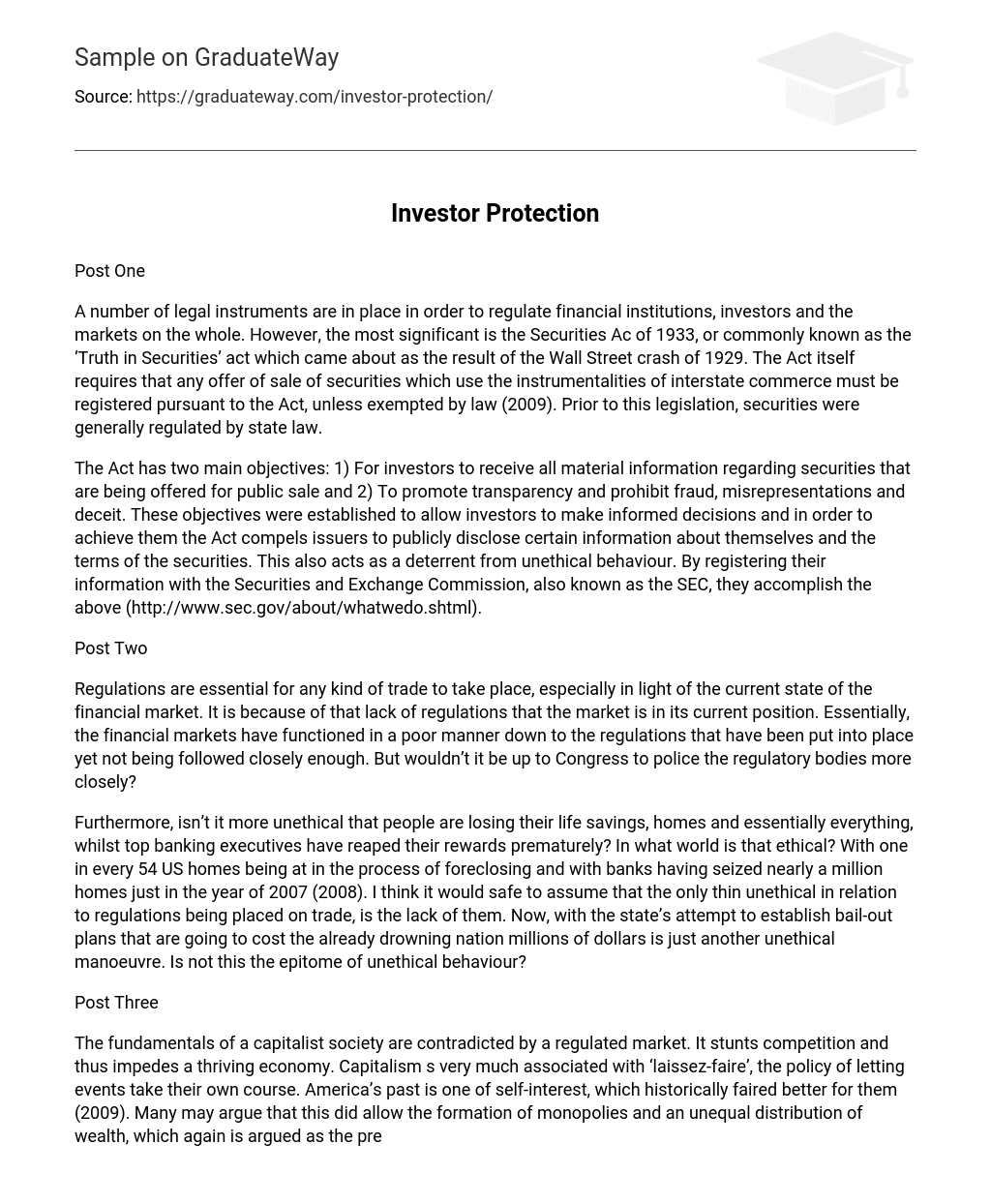Post One
A number of legal instruments are in place in order to regulate financial institutions, investors and the markets on the whole. However, the most significant is the Securities Ac of 1933, or commonly known as the ‘Truth in Securities’ act which came about as the result of the Wall Street crash of 1929. The Act itself requires that any offer of sale of securities which use the instrumentalities of interstate commerce must be registered pursuant to the Act, unless exempted by law (2009). Prior to this legislation, securities were generally regulated by state law.
The Act has two main objectives: 1) For investors to receive all material information regarding securities that are being offered for public sale and 2) To promote transparency and prohibit fraud, misrepresentations and deceit. These objectives were established to allow investors to make informed decisions and in order to achieve them the Act compels issuers to publicly disclose certain information about themselves and the terms of the securities. This also acts as a deterrent from unethical behaviour. By registering their information with the Securities and Exchange Commission, also known as the SEC, they accomplish the above (http://www.sec.gov/about/whatwedo.shtml).
Post Two
Regulations are essential for any kind of trade to take place, especially in light of the current state of the financial market. It is because of that lack of regulations that the market is in its current position. Essentially, the financial markets have functioned in a poor manner down to the regulations that have been put into place yet not being followed closely enough. But wouldn’t it be up to Congress to police the regulatory bodies more closely?
Furthermore, isn’t it more unethical that people are losing their life savings, homes and essentially everything, whilst top banking executives have reaped their rewards prematurely? In what world is that ethical? With one in every 54 US homes being at in the process of foreclosing and with banks having seized nearly a million homes just in the year of 2007 (2008). I think it would safe to assume that the only thin unethical in relation to regulations being placed on trade, is the lack of them. Now, with the state’s attempt to establish bail-out plans that are going to cost the already drowning nation millions of dollars is just another unethical manoeuvre. Is not this the epitome of unethical behaviour?
Post Three
The fundamentals of a capitalist society are contradicted by a regulated market. It stunts competition and thus impedes a thriving economy. Capitalism s very much associated with ‘laissez-faire’, the policy of letting events take their own course. America’s past is one of self-interest, which historically faired better for them (2009). Many may argue that this did allow the formation of monopolies and an unequal distribution of wealth, which again is argued as the premise of the Great Depression. However, it can not be argued that up until recently, the dollar was still the international currency due to the US’s ability to trade without allowing itself to be hindered by an abundance of regulation.
Some may argue that the sub-prime loan crisis has occurred to the lack of policing within the finance sector, however, prior to the bust, there is no denying the boom and strangely enough at that time, the situation was never deemed as ‘unethical’.
Congress needs to allow the natural laws of economics occur and allow the state to return to a laissez-faire climate.
References
http://www.u-s-history.com/pages/h844.html, retrieved 2009
http://www.upi.com/Business_News/2009/01/15/US_foreclosures_set_record_in_2008/UPI-89991232033154/ retrieved 2009
http://www.seclaw.com/seclaw.htm retrieved 2009





